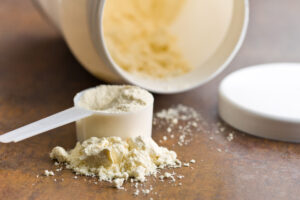Fuel for the Rink. Flavor for the Win.

Fuel up with Chocolate Milk
Milk is one of the most nutrient-dense beverages you can consume with 13 essential nutrients and 8g of protein. It’s also a healthy source of carbohydrates and consists of 85% water, making milk nutritious and hydrating.
Flavored milk offers the same 13 essential nutrients as regular milk. While it does have added sugars, it still stands out as one of the most nutritious beverage options available and a great addition to any athlete’s diet–especially for refueling post workout. Milk promotes muscle repair, replenishes electrolytes, rehydrates and provides energy-rich carbohydrates.
What dairy brings to the game
Dehydration can reduce strength, energy and coordination leading to poor athletic performance. Milk is made of 85% water, making it incredibly hydrating. A new study from Scotland’s St. Andrews University found milk to be even more hydrating than plain water due to its nutrient-rich composition. Milk naturally has nutrients that make it better for keeping you hydrated for longer. Research shows that while water does a pretty good job at hydrating the body quickly, the addition of fat, protein and a little bit of sugar found naturally in milk does an even better job of keeping you hydrated. These nutrients help slow the emptying of fluid from the stomach, keeping the body hydrated over a longer period of time.
Protein is an important component of every cell in the body. It builds and repairs muscle tissue, is good for bone growth and serves as a source of energy during high-powered endurance exercise. Milk is an optimal source of protein on a daily basis to build lean muscle, strength and endurance, as well as post-exercise for muscle recovery.
We lose electrolytes through sweat. Electrolytes—such as sodium, calcium, potassium, chloride, phosphate and magnesium—are important for a variety of reasons that impact hydration. This includes moving nutrients into your cells; helping your nerves, muscles, heart and brain work the way they should; and balancing the amount of water in your body. Water is hydrating, but it doesn’t include electrolytes and while sports drinks have become increasingly popular, you’ll find added sugar along with your added electrolytes. Milk is a great natural source of electrolytes.
Carbohydrates provide energy for the body. Milk contains an optimal ratio of carbohydrates to proteins that helps your body to refuel after exercise.
The B vitamins found naturally in milk (B2, B3 and B5) help convert carbohydrates, fats and protein into fuel for the body, increasing energy stores and performance.
The 13 essential nutrients in milk also contribute to overall health and wellness. For athletes, calcium, vitamin D, phosphorous, protein and potassium help to maintain strong bones and reduce the risk of stress factors. In addition, vitamin A supports the immune system.
Dairy Offers Something for Everybody
Growing bodies require vital nutrients, especially calcium, vitamin D and potassium, to develop strong bones and muscles. Including dairy as part of a healthy diet ensures kids and teens are getting the nutrition they need, while also offering variety and great taste.
Emerging scientific research is revealing that dairy food consumption is associated with several health benefits including reduced risk of cardiovascular disease and Type 2 diabetes, and lower blood pressure.
To minimize the progressive loss of muscle that occurs with aging, consuming high-quality protein from dairy foods along with resistance training, helps maintain muscle mass in older adults.
In addition to training, incorporating good nutrition to fuel, hydrate and refuel your body can elevate your athletic performance. Consisting of over 85% water, plus carbohydrates, protein and 13 additional essential nutrients, milk is an excellent choice for muscle recovery and hydration.





